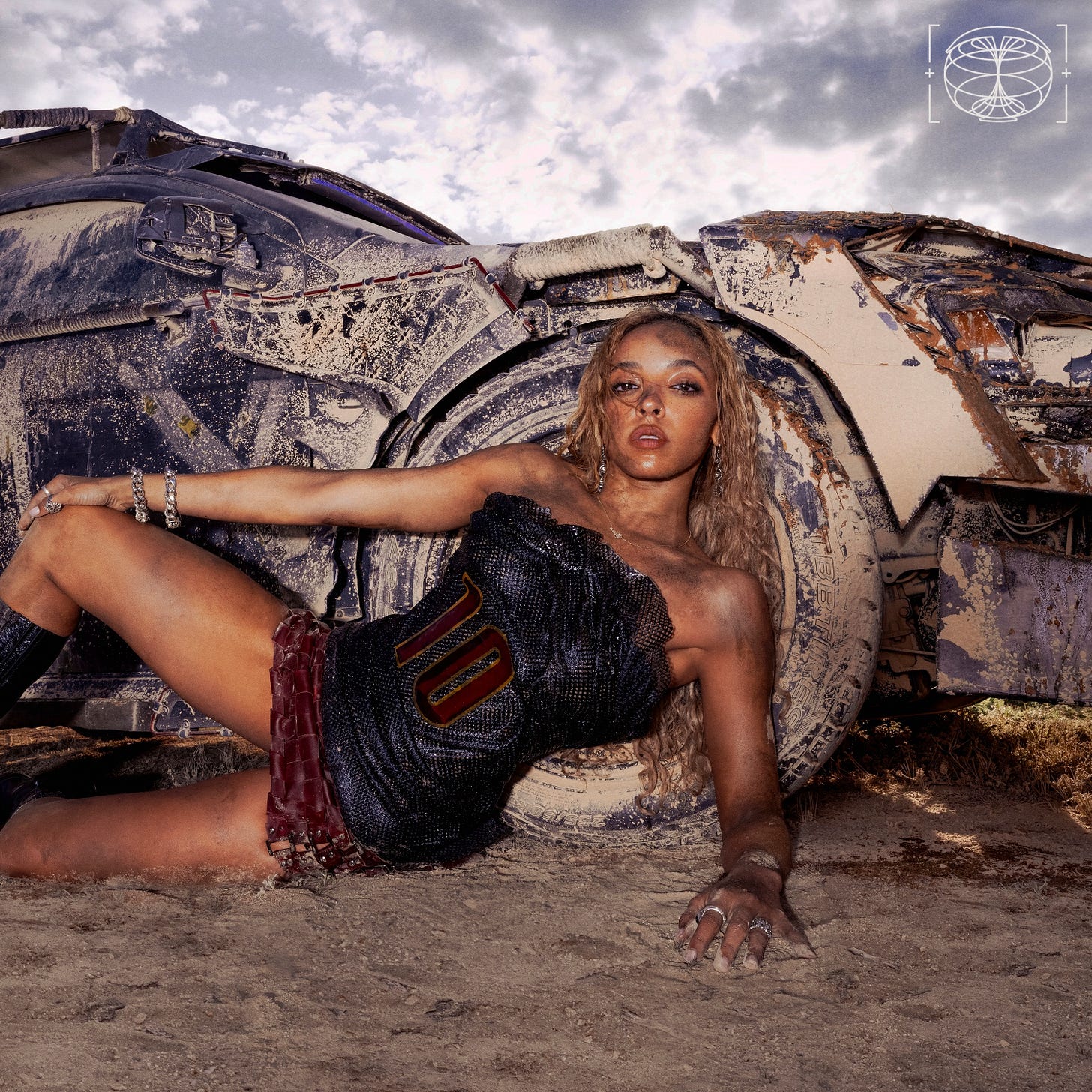Album Review: Quantum Baby by Tinashe
Tinashe’s second album of the BB/ANG3L trilogy series features a fascinating mix of electronic influences and songs with productions that fuse between styles, making it sonically enticing.
Since parting ways with her former label, RCA Records, Tinashe has enthusiastically embraced her newfound creative freedom. On her first self-released albums, 2019’s Songs for You and 2021’s 333, she ventured into diverse musical territories, from drum’n’bass on “Shy Guy” to retro-futuristic funk on “Perfect Crime,” alternating between singing and rapping with unbridled passion. This constant state of artistic bliss continues with her latest project, Quantum Baby, which preserves that spirit while introducing subtle refinements. Although more concise at only eight tracks, it radiates the same self-assurance: as polished and purposeful as a catwalk strut.
The triumph of “Nasty” was hard-earned. As Tinashe’s first Billboard hit since her auspicious 2014 debut “2 On” (feat. Schoolboy Q), which peaked at 25 on the Hot 100, it marks a significant milestone. “2 On” introduced the world to R&B’s rising star and provided a tantalizing glimpse of her smoldering, indulgent debut album, Aquarius. A communal celebration of getting drunk, faded, and unabashedly turnt, with the carefree ethos that characterizes every legendary party, “2 On” set the stage for Tinashe’s ascent. However, her career trajectory faltered shortly after Aquarius, largely due to mismanagement from RCA.
Her sophomore effort, Joyride, languished in development hell for three years; Rihanna even temporarily claimed the title track before being reclaimed. In a desperate attempt to appease restless fans, Tinashe leaked the single “Party Favors” featuring Young Thug and released the atmospheric mixtape Nightride as a conciliatory gesture. When Joyride finally materialized, it bore the scars of compromise, albeit with a few standout moments. Tinashe ultimately severed ties with RCA in 2019 to pursue an independent path.
This era of autonomy harkens back to Tinashe’s blog-era origins when she honed her production skills through YouTube tutorials and independently released three well-received SoundCloud mixtapes. While R&B remains her primary genre, Tinashe has consistently incorporated electronic elements into her music. With BB/ANG3L, the inaugural installment of her ongoing trilogy released last year, she fully immerses herself in an extraordinary fusion of R&B and electronic music, yielding her most outstanding work in a long time. The only moments that falter are those in which she adheres to conventional R&B approaches, straying from the exceptional electronic synthesis permeating most of the record.
In contrast, Quantum Baby, released this year, gravitates towards a warmer, more alluring sound—the kind of music one might encounter in the champagne room or a private suite rather than the main floor of a nightclub besides the first single. “No Simulation” articulates a genuine desire for authenticity in an era dominated by superficiality and acknowledges personal struggles, as evidenced by the lyrics: “Brought me back down to the ground when You left, messed up my mental health.” This sense of intimacy, coupled with her thriving self-assurance, imbues the album with a captivating potency. Tinashe employs a straightforward, conversational tone that oscillates between the pleasures of unbridled partying and the grueling exigencies of work in the drum-n-bass “Getting No Sleep.”
Throughout the song, she expresses a sense of youthfulness and the pursuit of enjoyment despite exhaustion, a theme that many will find relatable. “No Broke Boys” follows the same vein as “Nasty,” but it’s a self-empowerment anthem with elevated personal standards in romantic relationships, showcased within modern pop and R&B domains. This is further highlighted in the pre-chorus, where she clarifies her newfound expectations: “Now I got standards/Give a fuck how you feel.” The bass-heavy sdtroy-produced “Thirsty” colligates the intensity of desire with vivid imagery of emotional manipulation. In Eric Bellinger’s co-penned “Red Flags,” Tinashe’s lyrical content meticulously captures a problematic romantic relationship’s emotional turmoil and introspection. The structural composition of the song, with its crisp and evocative verses followed by a candid and repetitive hook, effectively mirrors the cyclic patterns often experienced in toxic relationships.
Quantum Baby may not reach the heights of its predecessor, but it’s still fun and an enticing listen as Tinashe hoops through different styles. She dips and dabbles on the drill-infused-jersey club beat on “Cross That Line,” exploring themes of hope, vulnerability, and the courage to pursue a significant relationship. “When I Get You Alone,” by far the album’s best track, showcases her songwriting and vocal abilities in a context that channels intense personal and sensual connections as provided by Jorgen Odegard and sdtroy with a two-part upbeat production. With these tracks and this album, Tinashe proves that she’s unafraid to take new risks, and we can have faith that it’ll pay off in the end.
Solid (★★★½☆)
Favorite Track(s): “Thirsty,” “When I Get You Alone,” “No Broke Boys”


